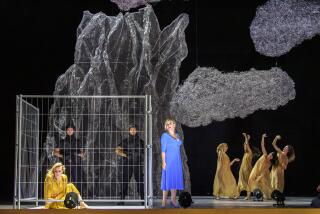Versatility, Surprises Mark Stade’s Poised Recital Style
Still irresistible after all these years, Frederica von Stade continues to reinvent the recital format with every appearance. Her latest local appearance, Thursday night at the Cerritos Center for the Performing Arts, displayed again the American opera singer’s charms and virtues.
Stade’s pure tone, poised in that felicitous area between the fat sound of contraltos and the light airiness of lyric sopranos, is as musically versatile as the mezzo-soprano herself. It accommodates lieder in German, melodies in French--still one of the singer’s deep specialties--and the pristine directness of Spanish.
But on Thursday, in addition to those languages, that tone was applied in all its wide-ranging expressiveness on the most wide-ranging repertory of all: art-songs, specialty numbers and songs from musical comedy, in English. The second half of this recital brought together nine such examples, exquisitely performed, every note part of a message, every syllable scrubbed brightly and delivered with affection.
Of course, with all her gifts and accomplishments, and her obsession with reaching an audience, Stade did not do this alone. Her longtime recital partner, the impeccable Martin Katz, a perfectionist with a sense of humor, played irrepressibly on a bright-toned Steinway.
Happy surprises abounded, first a delicate yet heartily communicative Faure group, then three genuinely romantic songs by Richard Strauss--no coyness, no pretense, no philosophy, just earthy lust leavened with sentiment--five pungent Argentine poems set by Ginastera, then a second half sung entirely in the language of the audience.
Somehow, as Stade indicated in nonpreachy spoken program notes, Michael Tilson Thomas’ multileveled gifts have not been entirely recognized by Southern California, where the conductor-composer was born and educated.
The singer went a distance toward righting that condition in the high point of the evening, two substantial cabaret songs by Tilson Thomas, “Message Machine Blues” and “Not Everyone Thinks That I Am Beautiful,” the latter written for Stade.
But there were other remarkable moments as well.
Faure’s “Clair de lune,” for one, here a plush layer of melody laid out on a background of pianistic velvet. Or the melancholy created by both artists in Ginastera’s touching “Triste,” the artful simplicity of Jerome Kern’s “I’ve Told Every Little Star,” the unspoken but palpable desperation in Sondheim’s “Losing My Mind,” from “Follies”--what a piece of acting that became.
Finally, two memorable, provocatively articulate encores: William Bolcom’s “Amor” and Carol Hall’s “Jenny Rebecca.”
More to Read
The biggest entertainment stories
Get our big stories about Hollywood, film, television, music, arts, culture and more right in your inbox as soon as they publish.
You may occasionally receive promotional content from the Los Angeles Times.










